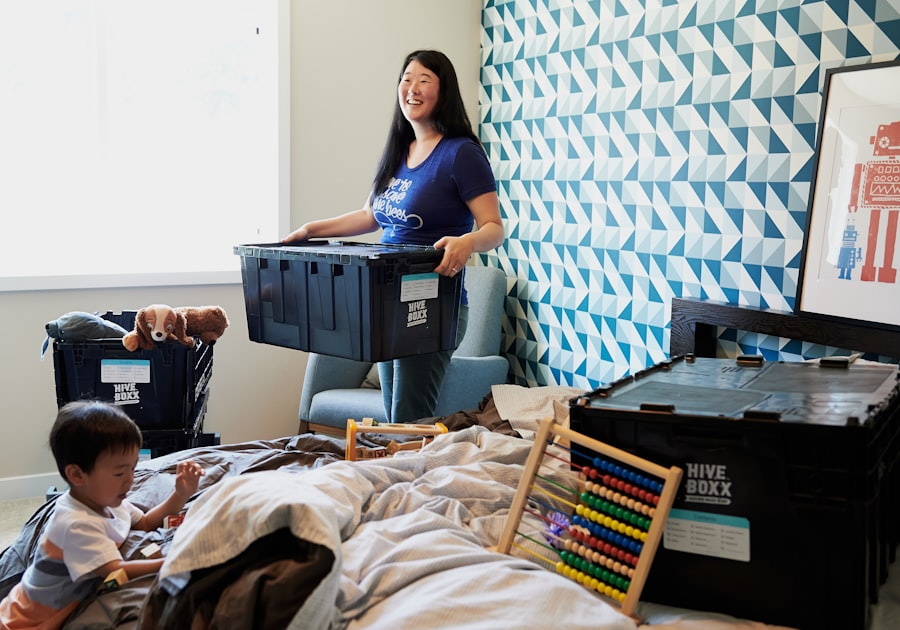Keeping your chickens healthy and happy is essential for their overall well-being. As a chicken owner, one of the most important aspects of chicken care is maintaining clean nesting boxes. In this blog post, we will discuss the risks of dirty nesting boxes, the benefits of clean nesting boxes, and best practices for maintaining a hygienic environment.
Key Takeaways
- Clean nesting boxes are crucial for the health and well-being of your chickens.
- Dirty nesting boxes can lead to health concerns for your flock, including the spread of disease.
- Clean nesting boxes can increase egg production and improve the quality of your eggs.
- Best practices for maintaining a hygienic environment include cleaning your nesting boxes at least once a week.
- Essential supplies for cleaning your nesting boxes include gloves, a scraper, and disinfectant.
The Risks of Dirty Nesting Boxes: Health Concerns for Your Flock
Dirty nesting boxes can pose several health risks to your flock. One of the main concerns is the spread of disease and parasites. Bacteria and other pathogens can thrive in dirty environments, leading to infections and illnesses in your chickens. Parasites such as mites and lice can also infest dirty nesting boxes, causing discomfort and potential health issues for your birds.
In addition to health concerns, dirty nesting boxes can also impact egg production. Chickens may refuse to lay eggs in dirty boxes, leading to a decrease in egg production. This can be frustrating for chicken owners who rely on their flock for a steady supply of fresh eggs.
Furthermore, foul odors and unsanitary conditions can attract pests and predators. Rats, mice, and other vermin are drawn to areas with food sources and unsanitary conditions. These pests can not only damage your coop but also pose a threat to your chickens.
The Benefits of Clean Nesting Boxes: Increased Egg Production and Quality
On the flip side, clean nesting boxes offer several benefits for both you and your chickens. First and foremost, clean nesting boxes can lead to increased egg production. Chickens are more likely to lay eggs in clean, comfortable environments. By providing them with clean nesting boxes, you are creating an inviting space for them to lay their eggs.
Clean nesting boxes also contribute to better quality eggs. When chickens lay eggs in dirty environments, the eggs can become soiled and contaminated. This can affect the taste and quality of the eggs. By keeping the nesting boxes clean, you are ensuring that your eggs are fresh and free from any contaminants.
Additionally, clean nesting boxes can prevent the spread of disease and parasites. Regular cleaning and maintenance can help eliminate any potential breeding grounds for bacteria and pests. This, in turn, leads to healthier chickens and a reduced risk of illness or infestation.
How Often Should You Clean Your Nesting Boxes? Best Practices for Maintaining a Hygienic Environment
| Frequency | Best Practices |
|---|---|
| Weekly | Remove all old nesting material and debris. Scrub the box with a mild soap and water solution. Rinse thoroughly and allow to dry completely before adding fresh nesting material. |
| Monthly | Perform a more thorough cleaning by removing the box from its location and disinfecting it with a solution of one part bleach to ten parts water. Rinse thoroughly and allow to dry completely before adding fresh nesting material. |
| As Needed | Monitor the boxes regularly for signs of mites, lice, or other pests. If an infestation is detected, remove the affected box and treat it with an appropriate pesticide or natural remedy before returning it to use. |
To maintain a hygienic environment for your chickens, it is important to clean the nesting boxes regularly. Best practices include cleaning the boxes at least once a week and replacing the bedding as needed. Regular inspections can also help identify any potential health concerns before they become major issues.
When cleaning the nesting boxes, it is important to wear gloves and a mask to protect yourself from any potential pathogens or allergens. Use a scraper to remove any soiled bedding or debris from the boxes. Once the boxes are empty, use a broom to sweep out any remaining dirt or dust.
After cleaning, it is important to add fresh bedding to the nesting boxes. This provides a clean and comfortable surface for your chickens to lay their eggs. Straw or wood shavings are commonly used as bedding materials.
Tools and Materials You’ll Need: Essential Supplies for Cleaning Your Nesting Boxes
To effectively clean your nesting boxes, you will need a few essential supplies. These include gloves, a mask, a scraper, a broom, and fresh bedding.
Gloves are important for protecting your hands from any potential pathogens or irritants. A mask can help prevent you from inhaling dust or other particles while cleaning. A scraper is useful for removing stubborn stains or debris from the nesting boxes. A broom is necessary for sweeping out any remaining dirt or dust.
Fresh bedding is essential for providing a clean and comfortable surface for your chickens to lay their eggs. Straw or wood shavings are commonly used as bedding materials. Make sure to have enough on hand to replace the old bedding during the cleaning process.
Step-by-Step Guide: How to Clean Your Nesting Boxes Safely and Effectively

Cleaning your nesting boxes can be done in a few simple steps. Here is a step-by-step guide to help you clean your nesting boxes safely and effectively:
1. Put on gloves and a mask to protect yourself from any potential pathogens or allergens.
2. Use a scraper to remove any soiled bedding or debris from the nesting boxes. Be thorough in removing all dirt and waste.
3. Once the boxes are empty, use a broom to sweep out any remaining dirt or dust.
4. Inspect the boxes for any signs of damage or pests. If necessary, take appropriate measures to repair or treat the boxes.
5. Add fresh bedding to the nesting boxes, ensuring that there is enough to provide a clean and comfortable surface for your chickens.
6. Dispose of the old bedding properly. If possible, compost it or dispose of it in a designated waste bin.
7. Wash your hands thoroughly after cleaning the nesting boxes.
Preventing Chicken Poop Mess: Tips for Keeping Your Nesting Boxes Clean Between Cleanings
To prevent chicken poop mess in your nesting boxes between cleanings, there are a few tips you can follow. One option is to use a poop board underneath the roosting bars. This board can be easily cleaned and replaced, preventing chicken droppings from soiling the nesting boxes.
Another tip is to add more bedding to the nesting boxes regularly. This helps absorb any droppings and keeps the boxes cleaner for longer periods of time. Regularly checking for and removing any soiled bedding can also help prevent poop mess in the nesting boxes.
Common Mistakes to Avoid When Cleaning Your Nesting Boxes: Tips for Success
When cleaning your nesting boxes, there are a few common mistakes to avoid. One mistake is using harsh chemicals or cleaning products that can be harmful to your chickens. It is important to use safe and effective cleaning methods, such as vinegar or hydrogen peroxide, which are natural and non-toxic.
Another mistake is not wearing protective gear. Gloves and a mask are essential for protecting yourself from any potential pathogens or allergens while cleaning the nesting boxes. It is important to prioritize your safety and take the necessary precautions.
To ensure success in maintaining clean nesting boxes, it is helpful to keep a cleaning schedule. Set a regular time each week to clean the boxes and stick to it. Involving the whole family in the cleaning process can also make it more manageable and enjoyable.
Troubleshooting: What to Do If You Encounter Problems While Cleaning Your Nesting Boxes
If you encounter problems while cleaning your nesting boxes, there are a few troubleshooting tips you can follow. For stubborn stains or odors, you can try using a mixture of vinegar and water or hydrogen peroxide. These natural cleaning agents can help break down stains and eliminate odors.
If you notice signs of pests or infestation, it may be necessary to seek professional help. Pest control experts can assess the situation and provide appropriate treatment options to eliminate any pests and prevent further infestation.
The Importance of Regular Maintenance for Healthy and Happy Chickens
Regular maintenance of nesting boxes is essential for the health and happiness of your chickens. By following best practices and using safe and effective cleaning methods, you can ensure a clean and comfortable environment for your flock. Clean nesting boxes contribute to increased egg production, better quality eggs, and healthier chickens overall. By prioritizing cleanliness and hygiene in your chicken coop, you are providing the best possible care for your feathered friends.
If you’re looking for tips on how to keep chickens from pooping in nesting boxes, you might also be interested in learning about the importance of providing a suitable coop for turkeys. Poultry Wizard has a helpful article on “Do Turkeys Need a Coop?” that provides insights into the specific requirements and considerations for housing turkeys. Understanding the needs of different poultry species can help you create a clean and comfortable environment for all your feathered friends. Check out the article here to learn more.
FAQs
What are nesting boxes?
Nesting boxes are compartments in a chicken coop where hens lay their eggs.
Why do chickens poop in nesting boxes?
Chickens may poop in nesting boxes because they see it as a comfortable place to rest or sleep.
What are the risks of chickens pooping in nesting boxes?
Chickens pooping in nesting boxes can lead to dirty eggs, which can cause health problems for both chickens and humans.
How can I prevent chickens from pooping in nesting boxes?
You can prevent chickens from pooping in nesting boxes by keeping the boxes clean, providing enough roosting space, and using materials that discourage chickens from sitting in the boxes.
What materials can I use to discourage chickens from sitting in nesting boxes?
You can use materials such as plastic or rubber mats, sand, or straw to discourage chickens from sitting in nesting boxes.
How often should I clean nesting boxes?
Nesting boxes should be cleaned at least once a week to prevent the buildup of feces and bacteria.
What should I do with the poop in nesting boxes?
You should remove the poop from nesting boxes and dispose of it properly, such as in a compost bin or trash can.
Meet Walter, the feathered-friend fanatic of Florida! Nestled in the sunshine state, Walter struts through life with his feathered companions, clucking his way to happiness. With a coop that’s fancier than a five-star hotel, he’s the Don Juan of the chicken world. When he’s not teaching his hens to do the cha-cha, you’ll find him in a heated debate with his prized rooster, Sir Clucks-a-Lot. Walter’s poultry passion is no yolk; he’s the sunny-side-up guy you never knew you needed in your flock of friends!







